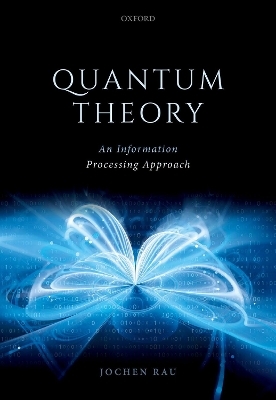
Quantum Theory
Oxford University Press (Verlag)
978-0-19-289631-5 (ISBN)
Recent advances in quantum technology - from quantum computers and simulators to secure communication and metrology - have not only opened up a whole new world of practical applications but also changed our understanding of quantum theory itself. This text, for the first time, introduces quantum theory entirely from this new perspective. It does away with the traditional approach to quantum theory as a theory of microscopic matter, and instead focuses on quantum theory as a framework for information processing. Accordingly, the emphasis is on concepts like measurement, probability, statistical correlations, and transformations, rather than on waves and particles. This affords a simple, direct route to quantum theory, all the way to some of its most fascinating conceptual issues. Since it requires only minimal mathematics and virtually no prior knowledge of physics, it is accessible to younger undergraduates and students of neighbouring disciplines.
The text offers a unique blend of insights both into the physical foundations and the practical application of quantum theory. It begins with a discussion of experimental evidence that forces us to abandon the classical description and to critically re-examine such basic notions as measurement, probability, and state. The thorough investigation of these concepts leads to the alternative framework of quantum theory, set in complex Hilbert space. The requisite mathematics is developed carefully and always linked to its operational meaning. This part of the text culminates in an exploration of some of the most vexing foundational issues of quantum theory, regarding locality, non-contextuality, and realism. The second half of the text explains how the peculiar features of quantum theory may be harnessed to tackle information processing tasks that are intractable or even impossible classically. It provides the essential tools for understanding and designing the pertinent protocols, and discusses a diverse range of examples representative of current quantum technology. These include standard examples like the secure distribution of cryptographic keys, as well as less known applications such as entanglement-assisted metrology. Throughout the text there is a wealth of classroom-tested and at times unconventional exercises.
Jochen Rau received degrees in physics and mathematics from Goethe University Frankfurt, University of Cambridge, and Duke University, and did postdoctoral research at Max Planck Institutes in Heidelberg and Dresden, at the European Centre for Theoretical Studies in Nuclear Physics and Related Areas, as well as at the Technical University of Darmstadt. He has taught theoretical physics at Goethe University Frankfurt and Ulm University, and is currently professor of mathematics at RheinMain University of Applied Sciences.
1. Introduction
1.1: Some Experimental Evidence
1.2: Logic
1.3: Probability
Chapter Summary
Exercises
2. Reasoning About Measurements
2.1: Testable Propositions
2.2: Reachable States
2.3: Maximal Knowledge
2.4: The Operations AND and OR
2.5: Composition
2.6: Exchangeable Assemblies
2.7: Measuring a State
2.8: Preparing a State
Chapter Summary
Further Reading
Exercises
3. Probability in Hilbert Space
3.1: Linear Algebra in a Nutshell
3.2: Propositions and States
3.3: Two-Level System
3.4: Observables and Transformations
3.5: Composite Systems
3.6: The Issue of Reality
3.7: Classical Limit
Chapter Summary
Further Reading
Exercises
4. Computation
4.1: Gates and Circuits
4.2: Universality
4.3: Measurement-Based Computation
4.4: Deutsch-Jozsa Algorithm
4.5: Ground States and Classical Optimization
4.6: Simulation
4.7: High-Precision Measurement
Chapter Summary
Further Reading
Exercises
5. Communication
5.1: Classical Information
5.2: Quantum Information
5.3: Cryptography
5.4: Superdense Coding and Teleportation
Chapter Summary
Further Reading
Exercises
References
Index
| Erscheinungsdatum | 27.07.2021 |
|---|---|
| Zusatzinfo | 60 line illustrations |
| Verlagsort | Oxford |
| Sprache | englisch |
| Maße | 173 x 246 mm |
| Gewicht | 568 g |
| Themenwelt | Mathematik / Informatik ► Informatik ► Theorie / Studium |
| Naturwissenschaften ► Physik / Astronomie ► Quantenphysik | |
| ISBN-10 | 0-19-289631-8 / 0192896318 |
| ISBN-13 | 978-0-19-289631-5 / 9780192896315 |
| Zustand | Neuware |
| Informationen gemäß Produktsicherheitsverordnung (GPSR) | |
| Haben Sie eine Frage zum Produkt? |
aus dem Bereich


